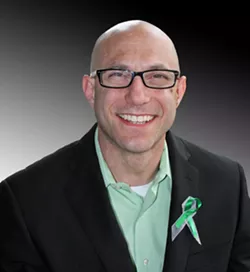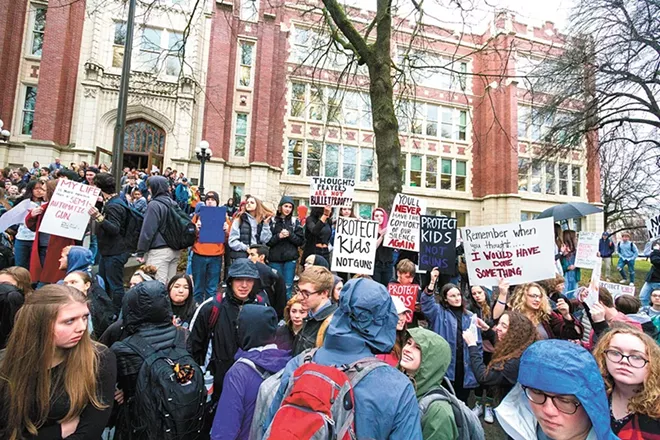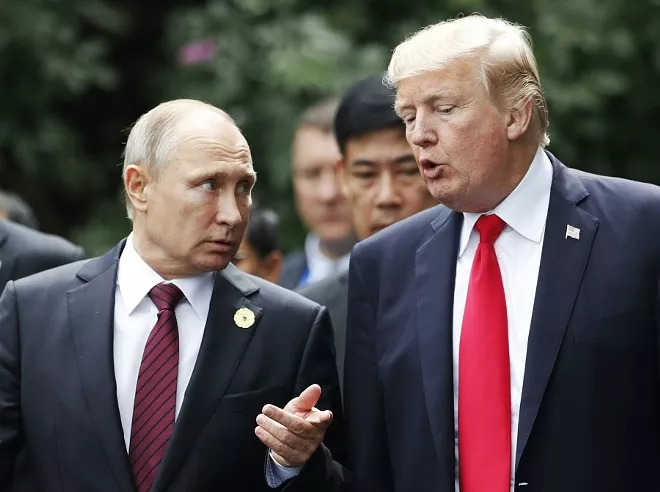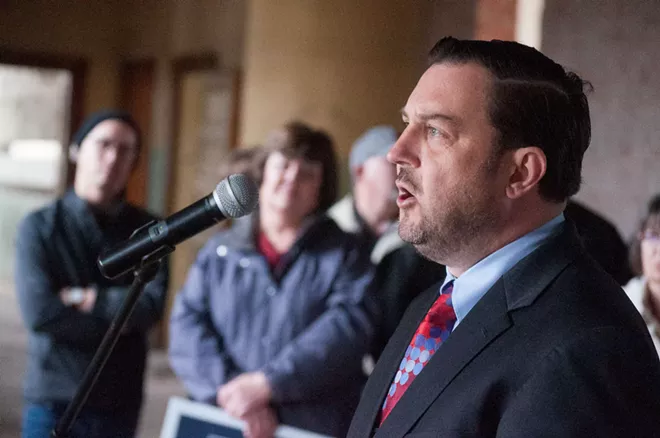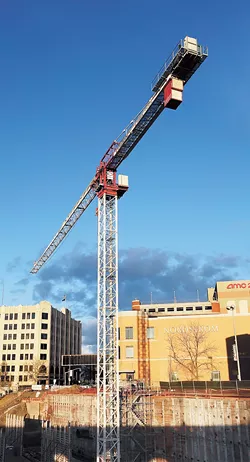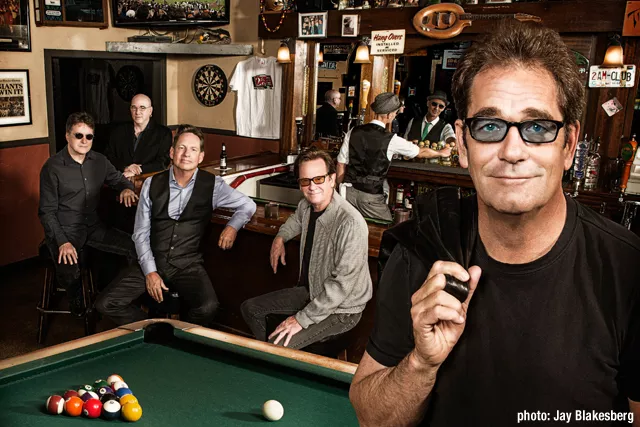Tuesday, April 17, 2018
It's been more than five years since Jeremy Richman and his wife Jennifer Hensel lost their 6-year-old daughter, Avielle Richman, in the shooting at Sandy Hook Elementary School in Newtown, Connecticut.
Ever
"My wife and I are scientists," Richman tells the Inlander. "When we were faced with this infinite heartbreak, we decided to take a scientific approach to see if we could fund studies understanding the risk factors and changes in the brain that leads to violence."
Richman will be in Spokane on Wednesday to speak at Gonzaga about how society can work to understand violence. Richman was invited by Our Kids: Our Business, a network of dozens of agencies looking out for the well-being of children, as part of Child Abuse Prevention Month.
Recent school shootings have sparked a national conversation about gun control and mental health. What's missing from that national conversation is a focus on understanding the brain science leading to what Richman calls "abnormal" behaviors that are acts of violence. On one side, you have people advocating for gun control. On the other hand, he says, you have people saying "guns don't kill people, people kill people," advocating for mental health support.
Richman says that saying should be finished: People kill people, with guns. Both mental health and gun control should be looked at, he says.
"We need to get away from black and white thinking," he says.
Nobody should ignore how firearms are "lethal forms of destruction," Richman says. At the same time, mental illnesses need to be better understood before they potentially manifest in violent ways.
Tags: sandy hook , newtown , jeremy richman , spokane , our kids: our business , violence , neuroscience , News , Image
After a 19-year-old shot and killed 17 students and staff at a high school in Parkland, Florida, and injured 17 more, local artist and mother Carolina Johnson thought, "Enough!"
Sparked by that "enough moment," Johnson and her friend, Janelle Carney, formed the nonprofit Art 4 Reform in about a month, with the idea of using art as a vehicle for change.
"We had a vision of trying to move people," says Carney, a local lawyer. "We're trying to change the focus back to safety and that children are dying at an alarming rate."
The two moms have already scheduled their first event to raise funds for Everytown for Gun Safety and Moms Demand Action, both groups that support gun control and safety. The event this Thursday, April 19, will be held at the McGinnity Room downtown at 116 W. Pacific Ave.
Johnson painted portraits of each of the 17 victims in the Parkland shooting and one of Sam Strahan, who was shot and killed by a 15-year-old student inside Freeman High School. Sam's mother, Ami Strahan, will speak at the event. Admission is free, and about 120 people have RSVP'd so far, Carney says. But they're prepared for many more.
Guests can make donations and bid on thousands of dollars in raffle items including wine, coffee, beer, clothing, fitness club memberships and more. The portraits will not be for sale. Rather, Carney says, they will be donated and could become part of an exhibit that travels across the country.
"It was an easy decision to make responsible gun ownership the focus of our first event," Carney says. "When we look at the faces of these victims, it strikes a chord. I want to empower people to act: If we don't like what is happening, then we need to come together and do something about it."
Tags: guns , gun safety , gun control , Ami Strahan , Sam Strahan , Freeman High School , Parkland shooting , gun violence , Art 4 Reform , News , Image
NEWS: Hundreds showed up downtown Spokane on Saturday for the second March for Science.
ARTS & CULTURE: The new Best of Broadway Spokane season was announced yesterday, and it includes favorites like The Lion King, Les Miserables
IN OTHER NEWS
Painkiller killers
Spokane County will decide today whether or not to join a nationwide lawsuit against opioid manufacturers. The suit accuses the manufacturers of knowingly lying about the addictive potential of opioids. (Spokesman-Review)
"Great kid, great teammate'
The Medical Lake community is honoring the 17-year-old girl, a member of the track team, killed this weekend in a car crash. One other girl who was in the car is in critical condition. (KXLY)
Life, liberty and the pursuit of yard sales
Spokane City Council will allow you to have just a couple more garage sales this year. The council unanimously passed changes to city law allowing up to four garage or yard sales a year. (Spokesman-Review)
Hannity: revealed
In a court hearing related to the materials seized from President Trump's personal lawyer, Michael Cohen, it was revealed that Cohen also represented a high-profile member of the media, one who has repeatedly defended Trump on-air over the Russia investigation. Cohen's client? Sean Hannity. (Washington Post)
Pleasing Putin
Two days ago, it appeared the Trump administration would impose Russian sanctions against the companies that helped Syria's chemical weapons program. Yesterday, Trump rejected those sanctions. (New York Times)
Tags: spokane , russia , sean hannity , yard sales , opioids , News , Image
Monday, April 16, 2018
New set of National Geographic Live! shows also on tap
There's just one show left in the current WestCoast Entertainment STCU Best of Broadway season, but before Dirty Dancing even tries to put Baby in a corner, you can start planning your ticket needs for 2018-19.
The new season was announced Monday, and while it will kick off a little later than usual as the INB Performing Arts Center gets a quick renovation between seasons, there's a lot to love between returning favorites and Spokane premieres, as well as some special one-night engagements and a new series of National Geographic Live!
Here's the lineup:
STCU BEST OF BROADWAY SEASON
• Finding Neverland, Nov. 15-18
• Waitress, Dec. 12-16
• Disney's The Lion King, Jan. 23-Feb. 3, 2019
• School of Rock, May 8-12, 2019
• Les Miserables, Aug. 6-11, 2019
Season tickets are on sale now, ranging from $238 to $417 for all five shows. A single-ticket on-sale date well be announced mid-summer.
SPECIAL ENGAGEMENTS
• A Magical Cirque Christmas, Nov. 20
• Legally Blonde The Musical, March 21, 2019
• Stomp, April 2-3, 2019
NATIONAL GEOGRAPHIC LIVE
• Pink Boots and a Machete with primatologist Mireya Mayor, Feb. 20, 2019
• Capturing the Impossible with extreme filmmaker Bryan Smith, March 27, 2019
• A Rare Look: North Korea to Cuba with photojournalist David Guttenfelder, April 24, 2019
This is the fifth season for National Geographic Live, and you can get a ticket package for all three shows for $81. Single-show ticket sales will be announced this summer.
Tags: Arts & Culture , For Fun! , best of broadway , spokane theater , westcoast entertainment , Image

Local residents Jim Harrison and his spouse of 45 years, Beatrice, sat on the steps next to the clock tower at Riverfront Park — patiently waiting for the rally to begin. The couple carried with them a sign that reads “MARCHING FOR MY GRANDDAUGHTERS’ FUTURE” and had pictures of their three grandchildren down below.
The two say they are worried about the state of world their three grandchildren will inherit.
“The idea that the wealthy would destroy our earth at this point in time without any remorse about what's gonna happen in the future is just disgusting to me,” Jim Harrison says. “And I think we need to make a big change in this country.”
The Harrisons were part of larger group of about a thousand who gathered Saturday in cities across the country for the for the second annual March for Science. The first March for Science last year brought more than a million people to what turned out to be the largest science advocacy event in history.
This year’s rally adopted the tagline “Vote for Science," aimed at prompting people to vote for environmentally friendly legislation and persuade politicians to increase funding for science education. There were stations at the march for people to register to vote. Event coordinators like Amanda Braley say she and many others feel that the government isn't doing enough for the environment and science in general.
“Honestly, we’d prefer not to have to do this,” Braley says. “We need to remind people that these issues are still at hand.”
The rally began at 12:30 pm at the clock tower in Riverfront Park. Speeches were then given by four guest speakers. University of Washington medical student Mara Hazeltine advocated for an increase in funding for science education in all classrooms across the country. Signs dotted the crowd that read “Make America Scientific Again!” and “It’s Not Nice to Hurt MOTHER NATURE.”

“I am marching with you today because I believe science belongs to everyone,” Hazeltine said, “not just the privileged few.”
Other guest speakers included Washington State PhD candidate Shannon Kozlovich, Jerry White from the environmental activist group Spokane Riverkeeper and Bethany Montgomery, community organization and Power 2 Poetry founder.
At 1 pm the crowd began their march through the streets of Spokane. Braley said she is frustrated with that lack of new legislation to combat climate change. Beatrice Harrison is upset with the changes happening in the U.S since the 2016 presidential election.
“Ever since Trump was elected, I can’t sleep at night. I wake up in the morning wondering what else he’s tweeted during the night,” Beatrice Harrison said. “And everything's he’s done, every move he makes is opposite of what I think needs to be done. So I feel like the citizens need to get out and protest every chance they get.”
Event organizers also distributed 300 tree seedlings for attendees to take home and plant.
“We love our outdoors, we love our clean air,” Braley said, “and we want it to stay that way.”
Tags: March for Science , News , Image
ON INLANDER.COM
NEWS: The youth suicide rate in Spokane is surging. From 2013 to 2016, it's more than doubled. School officials are trying to figure out why.
MUSIC: Huey Lewis has cancelled his tour, including a stop at the Northern Quest in August. He says it's because of hearing loss.
MOVIE: Isle of Dogs, which opened in Spokane this week, is Wes Anderson's tender and delirious, second stop-motion animation film. Without spoiling the entire thing, reviewer Jordan Satterfield writes, the story winds through government conspiracies, voter fraud and legislative corruption and mass deportation while exploring the bond between human and dog.
IN OTHER NEWS
Comey didn't hold back
"Slimeball," "morally unfit to be president" and a compulsive liar were among the descriptors former head of the FBI, James Comey, directed at President Donald Trump during an interview with ABC. Trump fired Comey in May 2017. During the interview, Comey refused to rule out the possibility that the Russians possess information to blackmail Trump. He also said there is "some evidence of obstruction of justice." (LA Times, AP)
The interview marks the beginning of a tour for Comey's new tell-all book, A Higher Loyalty: Truth, Lies, and Leadership. (ABC)
Trump's fixer in court
Trump's personal lawyer and fixer, Michael Cohen, will appear in federal court today to argue that prosecutors should not be allowed to review the materials seized from his office and hotel room last week. Some of the information, Cohen argues, is protected by attorney-client privilege. (Bloomberg)
Congressional climate ripe for a shift?
As Democrat Lisa Brown's campaign gains steam in its effort to unseat U.S. Republican Rep. Cathy McMorris Rodgers, longtime political reporter Jim Camden sees some similarities (and differences) in the political climate this year and the environment that gave George Nethercutt a victory over sitting speaker of the House, Tom Foley. (Spokesman-Review)
Black men arrested at Starbucks for sitting
Two black men were accused of trespassing at a Philadelphia Starbucks and arrested by police. A video of the arrests has been viewed online millions of times. Patrons can be heard saying that the two men "didn't do anything."
A manager had called police after the men asked to use the restroom, but were denied because they hadn't purchased anything. They then sat in the restaurant, waiting for a friend to arrive, when police were called. (NPR)
@Starbucks The police were called because these men hadn’t ordered anything. They were waiting for a friend to show up, who did as they were taken out in handcuffs for doing nothing. All the other white ppl are wondering why it’s never happened to us when we do the same thing. pic.twitter.com/0U4Pzs55Ci
— Melissa DePino (@missydepino) April 12, 2018
Tags: News , spokane news , Image
Sunday, April 15, 2018
Entertainment options abound as the weather warms, so peruse our event listings regularly to, you know... keep yourself entertained! Here are some highlights of the week ahead:
Monday, April 16
WORDS | It's the Spokane Poetry Grand Slam, a gathering and competition to determine which four poets will represent Spokane in the 2018 National Poetry Slam in Chicago later this year. It's happening at the Bartlett.
Tuesday, April 17
VISUAL ARTS | Join artist and poet Maya Jewell Zeller at Spokane Art School for a block printing class, starting today and running into may.
Wednesday, April 18
THEATER | The oh-so-popular Welcome to Nightvale podcast brings its live show to the Bing Crosby Theater tonight.
Tags: What's Up? , Image , Video
Friday, April 13, 2018
Striking a call for more urbanism, density and transparency, City Council President Ben Stuckart is running for mayor. For real this time...
Spokane City Council President Ben Stuckart was running for mayor of Spokane. It was April of 2016, three years before the election, but according to Stuckart it was as, "a sure thing as you can get."
But unless something drastic happened, Stuckart said then, he was going to be running for mayor in 2019.
Spokane City Council President Ben Stuckart had decided not to run for mayor of Spokane, after all. It was December of 2016, and Stuckart not running for mayor was as a sure thing as you can get.
"I will definitively not be running for mayor in 2019," Stuckart said.
The election of Donald Trump had sealed it. He would run for Republican Rep. Cathy McMorris Rodgers' U.S. House of Representatives seat instead.
Spokane City Council President Ben Stuckart had decided not to run for U.S. House of Representatives after all. It was June of 2017, and with his family facing some serious health issues, he'd decided to drop out of the race and concentrate on helping them.
"The campaign was only going to get busier," Stuckart told the Inlander. "The health issues in my families are only going to get more intense. I’m not able to fully focus right now. That’s only going to get worse."
Spokane City Council President Ben Stuckart is running for mayor of Spokane.
"I am going to run for mayor," Stuckart says today, in the lobby of an under-construction building on the east side of Spokane. "There is nothing that is going to make me back out. I'm committed to the race."
He'd thought about running a lot during the past year, but decided he would about two months ago. He says he wanted to be open and honest about his intentions to run.
"I'm running for mayor as 'Ben.' The guy who averages a parking ticket a week. The guy with a coffee tab at Atticus and a beer tab at Community Pint," Stuckart says, a crowd of supporters behind him. "I know our city. I love our city. I know what we can do, together."
Stuckart has the unique position of having actually designed the local campaign finance laws that will govern his own race.
"I think the law I've passed is actually going to make it harder for me," Stuckart says. (We assessed the possible impact of a possible Stuckart mayoral run here.)
Stuckart has a reputation as a key member of the city's liberal bloc, leading the council to introduce regulations about sick leave and passionately arguing for more protections for immigrants. He championed changing the name of Columbus Day to "Indigenous People's Day."
But in his campaign announcement, Stuckart stressed another part of his political identity harder: As an urbanist, the sort of leader enthusiastically supportive of dense, walkable developments. He looks at the city's extremely narrow vacancy rate, driving homelessness. He argues that more density is crucial to be able to fund more police officers and city services.
"I think urbanism is different from liberal and conservative. What urbanism is, is 'what do we want our cities to look like in the future. And are we willing to have mixed-income neighborhoods in the future, and live next to people who have different income levels?'" Stuckart says. "That's how you cure prejudice. Is 'we're all together in this,' right?
He says he sees a lot of classism in discussions around development.
"People say to me that they don't want apartments near them. What they're saying is, when we get down to it, 'We don't want poor people next to us,'" Stuckart says. "We need mixed-income neighborhoods. We all need to come together. We're stronger together. We're better together."
In the past, Stuckart has been a rare liberal to get an endorsement from the Spokane Home Builders Association. He floated the possibility of asking voters for more taxes to support the development and other services. He endorsed the controversial Greenstone development on the South Hill. He says he'll be leading the charge to decrease barriers for dense residential development, even if it irritates neighborhoods.
“I saw an email, from somebody the other day in one of our neighborhoods, that said ‘We have steeped roofs, and this would allow flat roofs, and we are opposed to these infill changes because we don’t want flat roofs in our community’,” Stuckart says, doing an indignant neighbor voice. “I just was, like,
Tags: Ben Stuckart , Mayor , spokane mayor , spokane , News , Image
We've got some sad News — Huey Lewis and the News, that is.
The '80s pop giants behind such No. 1 hits as "The Power of Love" and "Stuck with You" have canceled their upcoming tour, including a scheduled Northern Quest gig on Aug. 19, due to their frontman's worsening hearing loss.
"Two and a half months ago, just before a show in Dallas, I lost most of my hearing," Lewis said in a statement released earlier today. "I can't hear music well enough to sing. The lower frequencies distort violently making it impossible to find pitch."
Lewis goes on to say that he believes he's suffering from Ménière's disease, an inner-ear disorder that causes vertigo and tinnitus. Other notable musicians who have been afflicted by Ménière's include singer-songwriter Ryan Adams, who has spoken publicly about his hearing problems, and electric guitar innovator Les Paul.
"I feel horrible about this and wish to sincerely apologize to all the fans who've already bought tickets and were planning to come see us," Lewis' statement continues. "I'm going to concentrate on getting better, and hope that one day I'll be able to perform again."
Refunds will be issued for those who had already purchased tickets for the band's Northern Quest show, which would have paired them with soft-rock hitmaker Richard Marx. You can reach the casino at 481-2800 with any further questions.
Tags: Huey Lewis and the News , music , Northern Quest , concert cancelation , Image
DE LEON'S TACO BAR NO. 2 ON THE WAY
Favorite local Mexican food purveyor De Leon Foods announced this week that it’s expanding to Spokane’s Logan Neighborhood with the second location for De Leon’s Taco & Bar. To be located at 1801 N. Hamilton, in a building previously occupied by Chapala Mexican Restaurant, the taco bar is slated for a late summer or early fall opening.
The first location for De Leon’s Taco & Bar in North Spokane, near Whitworth University’s campus at 10208 N. Division, opened in mid-2017.
The forthcoming restaurant is owned by Sergio De Leon and family, who also operate both Spokane-area locations of De Leon Foods Mexican deli and grocery, which annually lands in the top three for the Inlander’s Best Of readers poll for “Best Mexican Food” and “Best Tacos.”
BURGERS FOR DAYS
In January, we presented readers with our first ever Burger Issue, which included roundups of the region’s best “bargain” burger nights, our staff’s favorite burgers, noteworthy vegetarian and vegan burgers, a guide to the many styles of fries and much more.
In the time since, a few notable updates to the Inland Northwest “burger scene” have come up, which are definitely worth sharing.
First up, the local fast-casual burger joint from chef Adam Hegsted, IncrediBurger & Eggs, is already set to expand into North Idaho. Word is out that the second location is planned for a newly constructed strip mall in the Ramsey Crossing development of Coeur d’Alene. No word on when, but if we had to guess it’ll likely debut sometime this summer.
Tags: Entree , burgers , De Leon Taco & Bar , burgers , beer , IncrediBurger , Remedy , Roger's Ice Cream & Burgers , Food , Image

